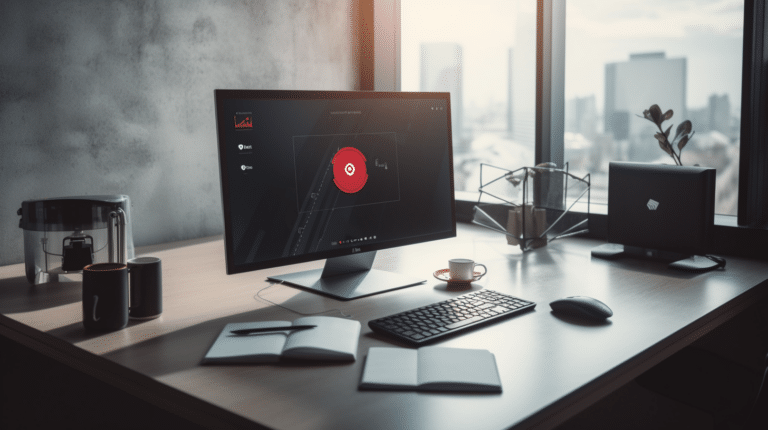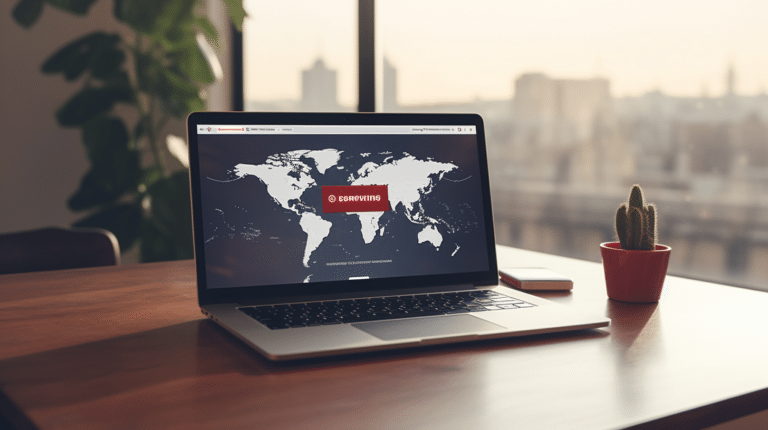In today’s digital age, safeguarding one’s privacy and data has become a top priority. One effective way to achieve this is by using a virtual private network, or VPN. VPNs provide secure connections between devices and private networks, masking your geolocation and encrypting data to ensure you maintain anonymity and security online. As we enter 2023, understanding the importance of VPNs and how to choose and set one up has become more essential than ever.
Setting up a new VPN may seem like a daunting task, but with a multitude of reliable services available and easy-to-follow instructions, even those with limited technical knowledge can enjoy the benefits of a VPN. The key to selecting the right VPN for your needs is understanding your requirements, such as the level of privacy, the choice of servers, and the ability to bypass geo-restrictions. By evaluating these factors, you can make an informed decision and improve the overall security of your online presence.
Key Takeaways
- VPNs are essential tools for protecting your privacy and data, particularly in today’s increasingly digital world
- Selecting the right VPN service depends on your requirements, such as server choices and geo-restriction bypass capability
- Setting up a VPN can be simple, even for those with limited technical expertise
Understanding VPNs
What is a VPN?
A VPN, or Virtual Private Network, is a service that creates a secure and encrypted connection between your device and the internet. By routing your data through a network of VPN servers, it ensures that your online activities remain private and protected from unauthorized access.
Why Use a VPN?
There are several reasons to use a VPN, which include:
- Enhancing privacy: VPNs help protect your online privacy by masking your real IP address and location, making it difficult for others to track your online activities.
- Improving security: A VPN creates an encrypted tunnel between your device and the internet, ensuring that your data remains secure from hackers and third parties.
- Accessing geo-restricted content: By connecting to VPN servers in different countries, you can bypass geographic restrictions and access content that may not be available in your location.
Common Features of VPNs
There are several common features to look for when choosing a VPN:
- Encryption: VPNs use various encryption protocols to ensure that your data is secure as it travels through the private network.
- Server locations: A good VPN will have a diversified network of servers spread across multiple locations, allowing you to connect securely and access content from various regions.
- Multiple device support: VPNs should provide support for connecting multiple devices, such as smartphones, tablets, and computers, ensuring comprehensive protection of your online activities.
- Privacy policy: It’s essential to choose a VPN provider that has a transparent and clear privacy policy, ensuring that they do not log or store any sensitive information about your online activities.
By understanding the basics of VPNs and considering the common features outlined above, you’ll be better equipped to make an informed decision when selecting a VPN service that best fits your needs and preferences.
Choosing A VPN Service
Factors to Consider
When selecting a VPN service, there are several factors to keep in mind. First and foremost, consider the features the service provides. Some essential features include solid encryption protocols, high connection speeds, and a wide range of VPN servers in various locations. Additionally, make sure the VPN is compatible with your preferred devices (such as Windows, MacOS, Android, and iOS) and any streaming services you might use, like Netflix.
It’s also crucial to find a service with a strong privacy policy. Avoid free VPNs as they may lack proper security measures and could compromise your personal data. Instead, opt for a paid VPN service with a clear and concise privacy policy that ensures no logging of your activities.
Remember to consider the service’s price and any available money-back guarantees. A comprehensive comparison of different VPN services’ features, speeds, and pricing is a wise step before making a final decision.
Reputed VPN Providers
There are several reliable and well-known VPN providers available in the market. Some of the best include:
- NordVPN: This provider offers a vast server network, high speeds, and strong security features such as Double VPN and CyberSec.
- ProtonVPN: Known for its focus on privacy and security, ProtonVPN offers a no-logs policy and secure core servers.
- CyberGhost: With a user-friendly interface, CyberGhost provides streaming-specific servers and robust security features.
- Private Internet Access: This provider offers a wide range of servers, customizable security settings, and an easy-to-use client.
Taking the time to research VPN services and their offerings ensures that you’ll find the best option for your needs. Keep in mind that no single VPN provider is perfect for everyone; instead, identify the factors most important to you and prioritize those when choosing a service.
Setting Up A VPN
Installation Guide for PC
To set up a VPN on your PC, start by choosing a VPN service that meets your needs. Once you have subscribed to the service, download the VPN app for your operating system (Windows 10, Windows 11, etc.) and follow the installation process. After successfully installing the app, launch it and sign in with your VPN account credentials. From there, you can connect to a VPN in Windows by selecting a server location and clicking the connect button. Your PC is now equipped with the VPN connection, and your IP address will be masked.
Configuration Guide for Mobile Devices
Setting up a VPN on mobile devices like Android and iOS involves similar steps. First, sign up for a VPN service and download the VPN app from the Apple App Store or Google Play Store. After installation, sign in using your VPN credentials and allow the necessary permissions for VPN access. In the VPN settings, select your desired server location and enable the VPN connection. Your mobile device is now secured with an active VPN.
Setting Up VPN on Your Router
Configuring a VPN on your router allows all devices connected to the network to benefit from the enhanced security and privacy features. To set up a VPN on your router, you will first need a router that supports VPN integration. Consult your router’s documentation for the exact process, as this may vary by model.
First, log in to your router’s control panel by entering its IP address in your web browser. Locate the VPN settings and input the required information provided by your VPN service. This may include server details, username, and password. Save the changes and reboot the router to activate the VPN connection. Your home network is now protected, and all connected devices will have their IP addresses masked while using the internet.
Remember to remain confident, knowledgeable, neutral, and clear when setting up a VPN, as this will ensure a smooth and secure experience across all your devices.
Maintaining Your VPN
Maintaining your VPN is essential to ensure a smooth and secure experience. This section will discuss three crucial aspects of maintenance: Updating VPN Application, Managing VPN Settings, and Resolving Common VPN Issues.
Updating VPN Application
Keeping your VPN app up-to-date is critical for optimal performance and security. VPN providers regularly release updates to fix bugs and improve app functionality. To update your VPN app, follow these steps:
- Visit your VPN provider’s website and check for the latest version of the software.
- If an update is available, download the new version of the app.
- Uninstall the old version of the VPN app from your PC.
- Install the new version and input your username and password to reconnect to the VPN service.
Managing VPN Settings
Proper management of VPN settings ensures a secure and stable connection. Here are some aspects to consider when managing your VPN settings:
- VPN Protocol: Choose the most suitable VPN protocol based on your needs. Common protocols include OpenVPN, L2TP/IPsec, and IKEv2.
| Protocol | Security | Speed |
|---|---|---|
| OpenVPN | Strong | Medium |
| L2TP/IPsec | Moderate | Fast |
| IKEv2 | Strong | Fast |
- Server Location: Select a server location that best aligns with your goals, such as better browsing speeds or accessing geoblocked content.
Resolving Common VPN Issues
Experiencing VPN issues can be frustrating, but many common problems have simple solutions:
- Connection Errors: If you are unable to connect to your VPN, double-check your username and password, ensure you are using the correct protocol, and confirm the status of your VPN provider’s servers.
- Slow Speeds: If you are experiencing slow speeds, try connecting to a different server location, changing the VPN protocol, or checking your internet connection.
- Software Errors: If the VPN app is not working properly, updating the software, reinstalling the VPN app, or contacting your VPN provider’s customer support may resolve the issue.
By staying on top of app updates, regularly managing your VPN settings, and promptly resolving common issues, you can enjoy a seamless and secure VPN experience.
Advanced VPN Topics
Split Tunneling
Split tunneling is a feature that allows you to choose which apps or websites should use the VPN connection, while the rest of your internet traffic goes through your regular connection. This can be helpful in balancing security and performance, as well as providing access to local network resources. For example, you can choose to have your browsing activities go through the VPN, while streaming services like Netflix use your regular connection. Most VPN providers, like ExpressVPN, offer split tunneling as an option in their settings.
Kill Switch and DNS Leaks
A kill switch is an essential feature for any reputable VPN service. It ensures that your internet connection is immediately cut off if the VPN connection drops, preventing any unencrypted data from being exposed. This is particularly important when using public Wi-Fi or in countries with strict internet censorship, like China.
DNS leaks occur when your computer sends DNS requests to your internet service provider (ISP) instead of the VPN service, revealing your browsing history and true IP address. To prevent DNS leaks, choose a VPN provider that offers built-in DNS leak protection, and always make sure to use their recommended settings.
Bypassing Geographical Restrictions
A VPN can help you bypass geographical restrictions by allowing you to appear as if you’re connecting from a different country. This can be useful for accessing content that is only available in specific countries, such as streaming services like Netflix. To bypass these restrictions, simply connect to a VPN server in the desired country, and your IP address will change accordingly.
When selecting a VPN provider, consider their server locations and whether they are known to work well with popular streaming services. It’s important to note that some streaming platforms actively try to block VPN usage, so you may need to use a provider that continually updates their servers, such as ExpressVPN.
Please note that using a VPN to bypass geographical restrictions may violate the terms of service of some streaming platforms. Always keep this in mind when using a VPN for these purposes.
The Dark Side of VPNs
Concerns About Free VPNs
Free VPNs might seem like a great option for users looking to save some money, but they come with their own set of risks. There is a possibility that the company offering a free VPN service has a hidden agenda (source). For instance, they may sell your data or bombard you with ads to generate revenue. Therefore, it’s essential to carefully research and choose a reputable VPN provider, even if it means spending a few bucks.
VPN and Malware Risk
Like any other software, VPNs can also be a potential vector for malware. Cybercriminals may distribute malicious VPN apps to infect your device with malware, such as adware or ransomware. Choosing a well-established VPN provider with a good reputation is crucial to avoid this risk. Be sure to check reviews, recommendations, and focus on VPN providers with clear, transparent privacy policies.
Privacy Impact of VPNs
While VPNs are designed as a privacy tool to protect your online data, some might still collect and store information about your internet activities. This data can be susceptible to browser fingerprinting and online trackers, negating the privacy benefits of using a VPN.
When choosing a VPN provider, look for companies with strict no-log policies, meaning that they do not store or share information about your online activities. Understanding where the VPN provider is based is also crucial, as privacy laws vary between countries.
In conclusion, it’s important to carefully select a VPN provider that prioritizes your privacy while keeping your device and data secure. Free VPNs might seem enticing, but the risks associated with them often outweigh the benefits they promise.
Frequently Asked Questions
How to obtain a free VPN for various devices?
There are several free VPN services available that cater to various devices. To obtain a free VPN, first, research and compare different free VPN providers. Some popular free VPNs include ProtonVPN, Windscribe, and Hotspot Shield. Once you have selected a provider, follow their instructions to download and install their applications on your devices.
How to set up VPN on Android mobile?
To set up a VPN on your Android mobile, follow these steps:
- Go to your device’s “Settings” menu.
- Select “Network and Internet.”
- Tap on “Advanced” and then click on “VPN.”
- Choose “Add VPN” and fill out your VPN’s necessary information.
- Save your settings and connect to the VPN service. A key icon should appear in your status bar, indicating your VPN connection is active.
What is the process for configuring a VPN on a computer?
Configuring a VPN on your computer may vary depending on your operating system. Generally, you would start by downloading the VPN service’s application from their website. Next, install the application and follow the provider’s instructions to set up and connect to their VPN servers. Once connected, your internet traffic should now be routed through the VPN’s secure tunnel.
How can one create a home VPN setup?
Creating a home VPN setup involves setting up a VPN server on your home network’s router. This process varies by router model and firmware, so refer to your router’s documentation for instructions. Alternatively, some dedicated VPN routers are available to simplify the process and ensure compatibility. After setting up your home VPN server, be sure to configure your devices to use this server when connected to your home network.
What are the steps for activating a VPN on a Chromebook?
Activating a VPN on a Chromebook involves:
- Downloading the VPN service’s application from the Chrome Web Store or the VPN provider’s website.
- Installing the application onto your Chromebook, then follow the provider’s instructions to set up and connect to their VPN servers.
- Ensure that your Chromebook directs internet traffic through the VPN by checking your connection settings and verifying a secure connection.
How to establish a VPN connection on Windows 10?
To establish a VPN connection on Windows 10:
- Download the VPN service’s application from their website.
- Install the application and follow the provider’s instructions to set up and connect to their VPN servers.
- You can also configure a manual VPN connection by going to the “Settings” menu, selecting “Network and Internet,” clicking on “VPN,” and then “Add a VPN connection.” Fill in the necessary information provided by your VPN service.
- Once connected, your internet traffic should be routed through the VPN’s secure tunnel.






